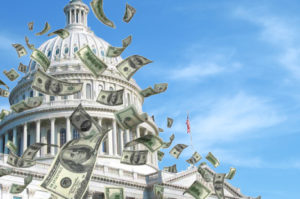Virginia’s Democratic legislators are convinced that citizens are happy to pay taxes for state services and will rebel at the polls if taxes are cut when there are “unmet vital needs.” That is why they have so far resisted any and all proposals from Governor Glenn Youngkin and Republican legislators to split the state’s fat cash surplus between tax relief and more spending.
So, why are those same Democrats not applauding the 2023 General Assembly’s failure to extend the state’s previous pre-school sales tax holiday? Shouldn’t the voters be happy to pay more for school supplies and clothes since the schools need the money? Instead they are joining the scramble to reinstate that tax break, open to all taxpayers, rich and poor.
The good news is the Assembly’s incompetence (or was it an accident?) in letting the sales tax holiday lapse is providing another prod to keep Democrats at the table for tax policy discussions. Frankly, from a tax policy purist point of view, these tax holidays are not good policy, but they are wildly popular.
That is because the sales and use tax is one people can see at the checkout counter. If you are saving $6-$7 on a Target run or Amazon bill, you notice. The other tax cuts under discussion – a higher standard deduction, a tweak to the income level that triggers the top income tax rate – only come up at tax-filing time, and if you use a computer program or outside accountant to file, you may never notice.
The bad news is that now the General Assembly can come together and fix this oversight (if it was an oversight) and claim a victory for taxpayers. They will claim a bipartisan victory over something that leaves those taxpayers exactly where they were a year ago, no better off at all. From the beginning, the claim that nobody had put the sales tax holiday on the Assembly’s radar during the session has lacked credibility. If so, retailers need new lobbyists.
Sarah Rankin of the Associated Press reported recently that House Appropriations Committee Chair (and lead House budget negotiator) Barry Knight (R-Virginia Beach) put a new plan on the table two weeks ago. Bacon’s Rebellion has now seen the letter. (Another link here.) The House has already given away so much of its original position it is hard to give enthusiastic support.
Completely gone are the Youngkin-proposed and House-approved cuts to the corporate income tax and a new business expense deduction for non-incorporated businesses. Given that the business community itself gave them no public support that is not surprising.
Also gone is the proposal to cut the overall top individual income tax rate from 5.75% down to 5.5%, which drew criticism from the left because (gasp) upper- and upper-middle income taxpayers would see real tax cuts from that. (Dear Democrats: Check the income levels in your crucial Northern Virginia precincts.)
Instead, Knight’s offer is to increase the threshold where the top tax rate kicks in, from the current $17,000 of taxable income to $21,000. That additional $4,000 at the lower rate would help the vast majority of taxpayers, upper, middle and lower income, but saves them only $30 per year. It is almost universal, however. According to Knight’s letter, that would save taxpayers $50 million overall in the first year and $107 million in a subsequent tax year.
He also proposes to increase the standard deduction again, always a good go-to move. Adding $1,000 to the deduction for individuals and $2,000 for a couple filing jointly provides another $57.50 or $115 (max) in tax relief. Combine them, and voters are supposed to cheer an ongoing tax cut of no more than $145 per family?
Finally, Knight retreats to the one-time cash rebate, $175 per person or $350 per couple. Yes, people can use the money, and surely the rush is on to get this all approved in time for voters to see the check before November 7. As with similar rebates in 2019 and just last year, this is a poor substitute for tax policy, and leaves intact all the recent tax increases and inflationary impacts which have driven the annual surpluses. The rebates are the same without regard to how much in taxes was actually paid, and thus quite a benefit to the lower-income cohort.
Also on Knight’s list are small amounts to increase a business interest expense deduction (the only business provision) and to allow younger military retirees to shield their pensions from state income tax. Everybody loves veterans (and their votes), so no one seems to question that their pensions are singled out for this exemption.
The rebates use $773 million of the less than $1 billion in surplus funds Knight would return to taxpayers. The ongoing tax cuts for the next full tax year would be about $340 million. The tax cuts proposed are right in line with recent advice from the Joint Legislative Audit and Review Commission on how to make taxes more progressive, but they are baby steps where major leaps are called for.
The campaign claim will be “we provided $495 in tax relief for a working family,” but 70% of that is a one-time grant. Knight has given away the store, the storage room and the sidewalk out front. If the Democrats cannot agree to this paper-thin proposal, they really are determined to protect the state’s overheated, inflation-fueled revenue production.
Are these ideas that Governor Youngkin has agreed to approve if the bill is put before him? That is unknown. Likewise, there is no Senate Republican response. The only Republican on record in support is Knight, although presumably he has the other Republicans on his committee behind him. We are down to a political game where any tax cut, even a mostly symbolic one, counts as a victory.


Leave a Reply
You must be logged in to post a comment.